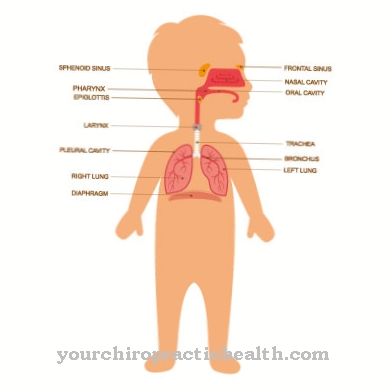The Dysentery is an inflammation of the bowel that often leads to severe diarrhea, stomach pain and vomiting. It is usually caused by a bacterial infection, but it can also be caused by viruses and parasites.
What is dysentery?

© freshidea - stock.adobe.com
Dysentery is an inflammatory disease of the intestine, especially of the large intestine. It causes severe diarrhea, which contains blood and mucus, as well as fever, stomach pain and obsession with stool.
The cause of the inflammation can be numerous infections, both bacterial and viral, or through parasitic infestation. The pathogens reach the large intestine through the digestive tract and are ingested orally through contaminated food or liquids. Each pathogen has different effects on the body, but all of them attack and damage the inner walls of the intestines, causing an immune system response.
These defensive reactions of the body lead to cramps, increased temperature and great loss of fluid through the stool. It is not uncommon for travelers to become infected with the pathogens at a tropical holiday destination by drinking contaminated water or eating fruit.
causes
The most common cause of dysentery is bacterial infection. Depending on the region, different bacterial strains predominate, which can cause dysentery.
Shigellosis, for example, is very common in Latin America, and Campylobacter bacteria in South-East Asia. Dysentery is much less likely to be caused by chemicals or parasites such as worms. The bacteria attack the inner lining of the intestine and thereby trigger the unpleasant symptoms. Both ways of infection are spread through ingestion of feces found in attempted water or food.
Particularly in regions of great poverty and overpopulation, in which the hygiene standards are extremely low, people run an increased risk of becoming infected with the pathogens and developing dysentery.
You can find your medication here
➔ Medication for diarrheaSymptoms, ailments & signs
Dysentery is usually associated with very unpleasant symptoms, all of which have a very negative effect on the quality of life of the person affected and also make everyday life much more difficult. Those affected primarily suffer from very severe diarrhea.As a result, deficiency symptoms or even dehydration often occur if the person concerned does not drink enough fluids again.
The dysentery also changes the color of the stool to a white and slimy consistency. For some people, this change can also lead to a panic attack. Those affected also often suffer from pain in the abdomen and stomach, which often leads to loss of appetite and weight loss.
Nausea and vomiting can also occur due to the dysentery and in turn have a negative effect on the quality of life of the person concerned. In some cases, the disease also leads to a fever and, in general, to permanent tiredness or fatigue. If the dysentery is not treated, it can also spread to the internal organs and lead to severe damage there too. This also reduces the life expectancy of the person affected.
Diagnosis & course
The diagnosis is made quickly and on the spot through a physical exam and a few questions about the symptoms. In this way, treatment can be initiated immediately. Infected people can have severe, mild, or no symptoms.
In extreme cases, people can lose up to a liter of fluid an hour. More often, people will complain of dizziness and stomach ache, as well as strong and foul-smelling diarrhea mixed with blood and phlegm, and causing pain. Vomiting and weight loss can also often be detected and support the diagnosis.
In rare cases, the dysentery and its infection can also affect other areas of the body, for example vital organs such as the liver, brain and lungs. Mouth, face and lips are most likely dry from the excessive fluid loss. Finally, a blood or stool test should determine which pathogen caused the dysentery.
Complications
In dysentery, patients suffer from severe discomfort in the stomach and intestines. As a rule, the patient is unable to eat and drink normally, resulting in underweight and dehydration. The symptoms are very similar to the symptoms of a typical gastrointestinal infection.
Those affected complain of vomiting and diarrhea. A severe fever also occurs, which can greatly reduce the patient's quality of life. Not infrequently, the diarrhea is bloody, which can lead to a panic attack in some people. The patients suffer from a general feeling of illness and can no longer be physically active due to the dysentery. As a rule, the patient needs a few days of bed rest in order to cure the disease successfully.
In most cases, no direct treatment is necessary, and the disease often disappears on its own after a day without further or serious complications. Otherwise, antibiotics can also be used. There are also no further complications. Life expectancy is not reduced because of the dysentery.
When should you go to the doctor?
If watery diarrhea suddenly develops, it may be dysentery. A doctor's visit is advisable if the symptoms have not subsided after three to five days at the latest. If the watery diarrhea turns into bloody or slimy-purulent diarrhea, it can be assumed to be severe. The disease should then be promptly clarified and treated by a doctor. Patients who also suffer from fever, abdominal cramps and colic should go straight to the nearest hospital.
This is especially true if signs of dehydration are noticed. Complicated symptoms such as arthritic joint changes, kidney failure or inflammation of the urethra and conjunctiva must be treated immediately by an emergency doctor. First aid measures may also need to be provided.
With such a severe course, a longer hospital stay is necessary. Depending on whether long-term damage has already occurred, further examinations must then be carried out. To avoid this, go to a doctor immediately if there are signs of dysentery. With early treatment, complications are extremely unlikely.
Doctors & therapists in your area
Treatment & Therapy
Dysentery is treated immediately with a WHO drinking solution. If this therapy is unsuccessful because the patient vomits too much or loses fluid through the intestines, fluids can also be taken intravenously.
Ideally, any drug therapy should wait until it has been found out which pathogen has infected the patient. If this analysis is not possible, a double therapy must be used, both against parasites and with antibiotics against the bacteria. In the case of mild shigellosis, the doctor may not prescribe any medication, only prescribe plenty of fluid intake and bed rest.
Dysentery caused by parasites must be combated with a dual drug strategy. After ten days of therapy with metronidazole, a cure with diloxanide furoate, a special remedy against this parasitic infestation, follows. The leaves of the kapok tree are used to relieve symptoms of the indigenous people of tropical areas around the world. However, relying on this treatment alone is not recommended.
Outlook & forecast
The prognosis for dysentery is good with rapid medical care. With the right medication and specialist medical treatment, the seldom occurring disease improves within a few days. Normally, recovery is achieved after about 1½ to 2 weeks. The patient usually needs some time to be completely symptom-free.
In mild cases, no drug treatment is necessary for the dysentery. With a stable and healthy immune system, the organism can independently bring about a healing. The germs die and are then transported out of the body. If the symptoms persist for several days or if they intensify, complications and further illnesses can occur.
In severe cases there is a risk of dehydration and dehydration. This is a life-threatening condition of the body that is an emergency. Organ failure can result and the patient can die. Overall, people with a weakened immune system have a less favorable prognosis. This is especially true if they do not seek treatment. The bacteria responsible for dysentery spread within a short time in the organism and weaken the body. It can lead to malfunctions and failures.
You can find your medication here
➔ Medication for diarrheaprevention
In order to prevent dysentery, particularly hygienic advice must be followed. You should wash your hands thoroughly with soap after every trip to the toilet. Regular hand washing is generally recommended. Hands should also be washed before coming into contact with food, young children or when feeding the elderly. If possible, there should be no close contact with infected people. Sharing detergents and hygiene products should also be avoided.
Aftercare
Since dysentery is a complicated and, above all, serious disease, there are very few options for follow-up care. First and foremost, a rapid diagnosis and treatment of this disease must be carried out so that there are no further complications in the intestine of the person concerned. In any case, early detection has a very positive effect on the further course and can prevent some complaints.
In most cases, dysentery can be treated relatively well with medication or by changing your diet. There are no particular complications if the person concerned follows the doctor's instructions. The medication should be taken regularly and correctly, taking care to ensure the correct dosage.
If anything is unclear or questions arise, a doctor must be consulted. Furthermore, regular examinations of the intestine are useful in the case of dysentery in order to identify and remove an ulcer or tumor quickly and early. In general, it is impossible to predict whether dysentery will have a negative impact on the life expectancy of those affected.
You can do that yourself
The possibilities for those affected to support their bodies in surviving the dysentery depend on the severity of the disease. Using home remedies alone is usually not recommended, as the pathogens should be killed with pharmaceuticals. Otherwise the duration of the dysentery will be greatly extended.
In any case, those affected should practice gentle behavior that is only interrupted by frequent visits to the toilet. The way to the toilet should be kept free. For people with restricted mobility, diapers or pads for the bed may be necessary.
In addition to drug therapy, it is important to drink a lot. In this way, the lost fluid is returned to the body. A diet containing electrolytes (rice, bananas, apples, vegetable broths, etc.) can be forced by the person concerned, but in severe cases of dysentery it will be necessary inpatient and intravenous.
Those affected should boil or dispose of washing and hygiene items that they use during their illness after they have healed. This serves to protect other people and against possible re-infection with the germs.
Kapok (the fiber of the kapok tree) can also be used as a support. This has an antibacterial effect, but in no way replaces antibiotics.

.jpg)



.jpg)


















.jpg)



